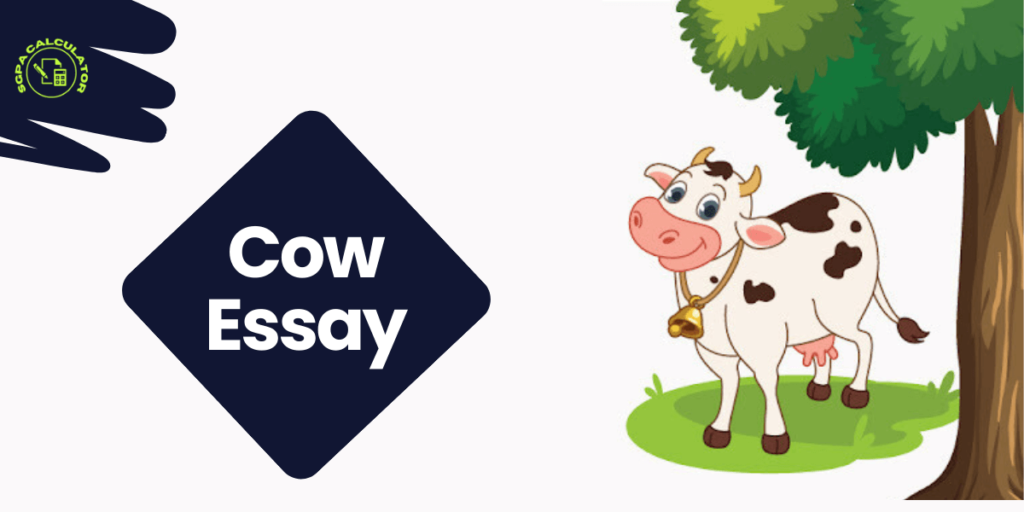In the cultural, religious, and practical landscape of India, the cow essay cow occupies a cherished and multifaceted place. It is revered as sacred and represents divinity, sustenance, and harmony. This essay explores the cultural, historical, religious, and economic significance of cows in India.
Historical and Religious Significance
Since agricultural and pastoral civilizations first discovered how vital the cow was to sustaining life, they have held a special place in history and religion. The cow is frequently seen as a representation of the divine in Hinduism and is connected to many gods, especially the sacred cow Kamadhenu. Its presence is thought to bestow blessings on a household and is regarded as a source of life and wealth. The reverence for the cow in Indian culture has been greatly influenced by religion.
Read Our Essay: My School Essay
Cultural and Traditional Ties
Traditions and rituals in India reflect the importance of the cow and are woven into the country’s cultural fabric. In both rural and urban cultures, cow worship and protection are deeply rooted practices. Feeding and caring for stray cows is part of the traditional “go-seva” (service to cows) practice, which stands for respect for all living forms and a dedication to nonviolence.
Economic Utility
It is impossible to ignore the cow’s economic utility. It is a primary source of milk, a component of many dairy products, and a mainstay in Indian meals. In certain rural regions, cow dung is utilised as a natural fertiliser, fuel, and even for conventional building materials. Additionally, leftovers from cows are used in many industries, including leather, agriculture, and even the generation of biogas.
Read Our Essay: My Mother Essay
Environmental and Agricultural Role
Cows play an agricultural and environmental role. They support environmental sustainability. They are herbivores that help keep ecosystems in balance by eating plant material that could otherwise overgrow. They are an essential component of agricultural techniques since their dung acts as an invaluable natural fertiliser that improves soil quality and increases crop yields.
Challenges and Controversies
Despite the cow’s respected status, there have been conflicts and issues related to its significance. It has been discussed how the cow protection controversy affects social cohesion. Cow vigilantism and unlawful cow slaughter incidents have brought to light the difficulties in striking a balance between religious conviction and pragmatic reasons.
Changing Attitudes
There is a growing trend in modern India to balance traditional veneration with contemporary activities. The issue of stray and abandoned cows has led to the establishment of cow shelters and care facilities. These initiatives signify a change toward a more comprehensive strategy for cow protection that takes into account their welfare, usefulness, and cultural significance.
Read Our Essay: Essay On Diwali
Cow Conservation and Animal Welfare
Efforts are being made to increase public awareness of the ethical treatment of cows and the significance of their protection. These programs place a strong emphasis on providing cows with responsible care, wholesome food, and compassionate treatment throughout their lives. This includes making sure they are safe in both urban and rural areas.
Global Perceptions
The significance of the cow transcends the boundaries of India, frequently inspiring interest and cross-cultural dialogue. It has drawn the interest of tourists, academics, and enthusiasts from all over the world as a representation of India’s variety and religious tolerance.
Promoting Sustainable Methods
In order to maintain the relevance and welfare of the cow, it is crucial to embrace sustainable methods. Encouragement of biogas production, cow dung use as a natural fertiliser, and organic farming all help preserve the environment and promote economic growth.
Read Our Essay: Global Warming Essay
Summary
In India, the cow represents more than just an animal; it also has spiritual, cultural, economic, and ecological value. Its respected status demonstrates the country’s dedication to protecting environmental harmony and upholding respect for all life forms. To preserve the entire wellbeing of the cow, it is crucial to strike a balance between conventional ideas and contemporary procedures, even though difficulties and conflicts still exist. It is essential to uphold the ideals of compassion, sustainability, and cultural diversity that the cow stands for as India develops.





